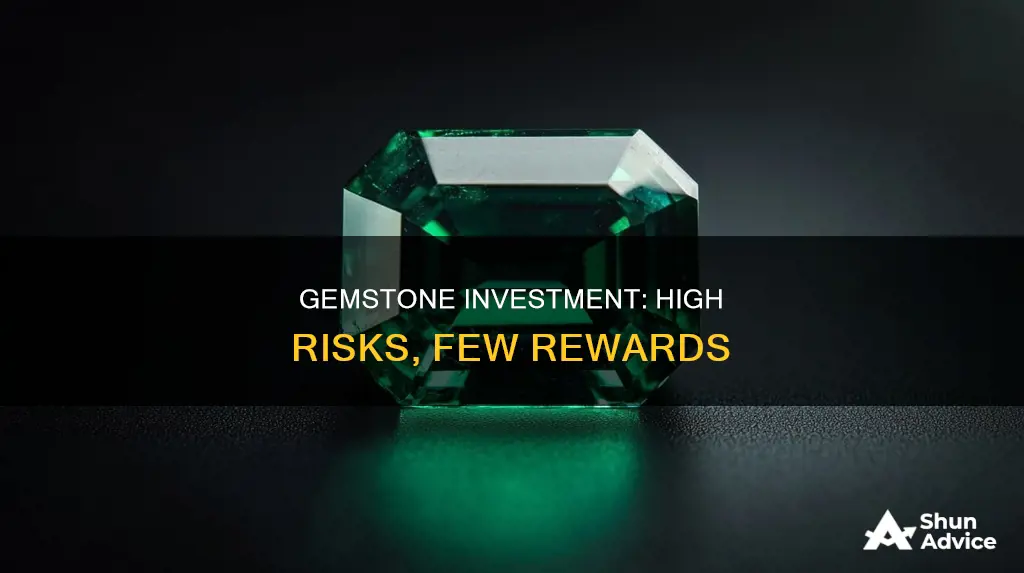
Investing in gemstones has become an increasingly popular alternative investment option, especially in times of economic uncertainty. While gemstones offer a unique opportunity to diversify one's portfolio, there are several risks associated with this type of investment that potential investors should be aware of. Understanding these risks is crucial for effective risk management and making informed decisions.
| Characteristics | Values |
|---|---|
| Market risk | Events in the broader economy that affect the gemstone market |
| Liquidity risk | The risk of not being able to resell the gemstone when desired |
| Time horizon risk | The need to sell sooner than planned due to unforeseen circumstances |
| Market volatility | Gemstone prices fluctuate |
| Authentication and fraud | Requires certificates of authenticity from esteemed gem laboratories |
| Storage and insurance | Requires secure storage and insurance against theft or damage |
What You'll Learn

Market volatility
Gemstone prices can be influenced by various factors, including supply and demand dynamics, economic conditions, and market speculation. For example, the gemstone tanzanite experienced significant price volatility due to government interventions and export bans in its sole country of origin, Tanzania. In 2010, retail prices for tanzanite skyrocketed due to government efforts to prevent smuggling and ban exports of large rough stones. However, in 2014, prices crashed, demonstrating the volatile nature of the gemstone market.
To mitigate the risk of market volatility, investors can diversify their gemstone portfolio by investing in a range of gemstone types and qualities. Diversification helps to balance the risks and potential returns across different gemstones. Additionally, investors should stay informed about market trends, research supply and demand dynamics, and follow industry news to make more informed investment decisions.
Furthermore, it is essential to consider the rarity and demand for specific gemstones. Rare and high-quality gemstones, such as natural sapphires, emeralds, and rubies, tend to have higher intrinsic value and are sought after by collectors and investors. These gemstones have a track record of long-term value appreciation due to their limited supply and enduring popularity.
While gemstones offer a compelling investment opportunity due to their scarcity, tangibility, and historical longevity, market volatility remains a risk that investors should carefully consider and actively manage through diversification and informed decision-making.
E-commerce Investment Strategies for India: A Comprehensive Guide
You may want to see also

Liquidity risk
Gemstones are not as easily converted into cash as other assets, and finding buyers can be challenging. The market for gemstones is relatively small and specialised, and there may not always be a ready pool of buyers. This lack of liquidity can make it difficult to exit an investment quickly, especially if the gemstone is rare or lesser-known.
Additionally, the resale value of gemstones can be unpredictable. The value of a gemstone depends on various factors, including rarity, quality, and market demand. These factors can be difficult to predict and can fluctuate over time, impacting the liquidity of the gemstone investment.
To mitigate liquidity risk, it is crucial to conduct thorough research before investing in gemstones. Understanding the market demand, rarity, and potential future valuation of a gemstone can help investors make more informed decisions. Additionally, working with reputable gemstone dealers and obtaining certificates of authenticity from esteemed gemological laboratories can enhance the likelihood of a successful resale.
Furthermore, investors should be prepared to hold their gemstone investments for extended periods. Gemstone investing often requires a patient and long-term approach, as significant returns may take years or even decades. By accepting the potential for a longer investment horizon, investors can increase their chances of finding buyers and achieving desirable resale values.
Understanding the Evolution of Investment Risk
You may want to see also

Time horizon risk
When investing in gemstones, it is important to adopt a long-term perspective. Gemstones are not a quick way to get rich, and their value can take years, or even decades, to appreciate significantly. Thus, investors need to be prepared to hold on to their gemstone investments for extended periods to benefit from market growth.
The need to sell prematurely can arise due to various unforeseen circumstances, such as financial emergencies, changes in personal situations, or shifts in the economic climate. For example, an investor may need to access their capital quickly and be forced to sell their gemstones at a suboptimal time, potentially incurring losses or missing out on future gains.
To mitigate time horizon risk, investors should ensure they have a sufficient financial cushion to cover any unexpected expenses without needing to liquidate their gemstone investments. Diversifying one's investment portfolio across different asset classes can also provide flexibility and reduce the likelihood of needing to sell gemstones prematurely. Additionally, staying informed about market trends and seeking professional advice can help investors make more strategic decisions when faced with unforeseen events.
While time horizon risk is an inherent part of investing in gemstones, careful planning, diversification, and a long-term outlook can help investors manage this risk effectively.
Integrity Metrics: Management's Investment Guide
You may want to see also

Authentication and fraud
The gemstone market is not immune to scams and fraudulent activities. Thousands of consumers fall victim to gemstone investment schemes annually, with individual losses exceeding $100,000 in some cases. These schemes often involve telemarketers or unsolicited phone calls, emails, or website links, promising get-rich-quick profits and exploiting fears of economic uncertainty.
To mitigate the risk of fraud, it is crucial to conduct thorough research on the gemstone market and deal only with reputable gemstone dealers. A certificate of authenticity from esteemed gem laboratories, such as the Gemological Institute of America and the American Gemological Laboratories, is essential. These certificates provide valuable information about the gemstone's origin, characteristics, and any treatments, helping to determine its value.
Additionally, it is advisable to independently hire a trusted appraiser to assess any gemstones you intend to purchase. Understanding gemstone quality, grading, and realistic market values is also important. Be cautious of high-pressure sales tactics and always insist on a written agreement outlining all terms of the sale, including return and resale policies.
Remember, the promise of quick and substantial profits is often a red flag, and there are no shortcuts to wealth in the gemstone market. By staying vigilant, conducting due diligence, and working with reputable sources, you can significantly reduce the risk of fraud when investing in gemstones.
Equity Investing: Startup Strategies for Smart Returns
You may want to see also

Storage and insurance
Storage Options:
- Home Storage: Storing gemstones in a safe at home is one option. High-quality safes can be heavy and expensive, but they provide secure storage. Some people also opt for unconventional methods like burying gems in their gardens or hiding them in cavities and double walls. It is crucial to keep the gemstones' certificates separate from the stones themselves to hinder potential resale in case of theft.
- Bank Safe Deposit Boxes: Banks offer safe deposit boxes, but they tend to be more expensive and accessible only during opening hours, with identification requirements.
- Private Safe Deposit Box Providers: Private providers often offer 24-hour access through various means, such as keys, codes, or cards. It is essential to consider not only the opening fees but also the annual fees and additional insurance costs.
- Insured Storage Services: Some companies offer insured storage services for gemstones in high-security facilities, typically charging a percentage of the net acquisition value per year. For significant investments, storage in a bonded warehouse is also an option.
Insurance:
When considering insurance for your gemstones, review your household insurance policy to understand what valuables are covered and the specific storage conditions required for coverage. If you opt for a safe deposit box, ensure you know the insured amount. For jewellery, there are specific safe deposit and carrying insurance options available. Reputable gemstone companies often have connections with reliable insurance providers and can facilitate these arrangements.
In summary, investing in gemstones requires careful consideration of storage and insurance. While there are various options available, each has its own set of advantages, costs, and constraints. It is essential to research and select the most suitable option for your circumstances to ensure the security and protection of your valuable gemstone investments.
Troy, MI: The Smart Investment Hub
You may want to see also







